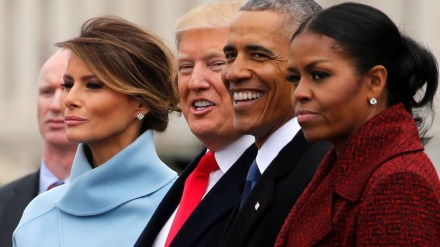Michelle Obama Skipping Trump Inauguration: As January 20 draws near, the nation gears up for Donald Trump’s inauguration as the 47th President of the United States. The ceremony, expected to draw a host of dignitaries and past leaders, will, however, be marked by the absence of a significant figure: former First Lady Michelle Obama.
The decision to forgo attending Trump’s inauguration, while her husband, Barack Obama, joins other former presidents in the ceremony, has sparked widespread attention. Traditionally, it is customary for former presidents and their spouses to attend the inauguration of a newly elected president, regardless of political affiliation. Michelle’s absence marks a clear departure from this tradition and has raised many questions about her reasons.
Why is Michelle Obama Skipping the Inauguration?
Officially, the statement from Michelle Obama’s office was terse: “Former President Barack Obama is confirmed to attend the 60th Inaugural Ceremonies. Former First Lady Michelle Obama will not attend the upcoming inauguration.” No specific reason was given for her absence, but sources close to the former First Lady suggest that her decision is very much intentional.
As a public figure known for her candidness, Michelle Obama has built a reputation for making deliberate choices about her public appearances. Her decision not to attend is seen as a reflection of her personal stance on Donald Trump and his policies. Over the years, Michelle has been outspoken about her disdain for the President, especially regarding his promotion of the “birther” conspiracy theory that questioned Barack Obama’s legitimacy. She has stated that this baseless attack put her family’s safety at risk and that she could never forgive Trump for it.
In her memoir Becoming, Michelle recounts the moment Trump began pushing the birther theory, noting the fear and frustration it generated. She also spoke of the anxiety she felt while in the public eye, particularly during Trump’s inauguration in 2017, where her expressions of discomfort became a symbol of the nation’s divided sentiments. Michelle admitted to having “stopped trying to smile” during Trump’s first swearing-in ceremony, and her discomfort was palpable.
Political Tensions and the Media’s Focus
Michelle Obama’s absence comes amid an increasingly polarized political landscape in America. Since leaving the White House, she has continued to advocate for political and social causes that contrast sharply with the views held by Trump. In 2024, as she campaigned for Vice President Kamala Harris, Michelle openly criticized Trump’s political rhetoric, particularly his attacks on women and people of colour. Her vocal support for progressive policies has positioned her as a leading voice against Trump’s style of governance.
The decision to skip the inauguration can thus be seen as an extension of Michelle’s broader political stance. Her critics may view this as another example of her personal dislike for Trump, while her supporters see it as a principled stand against a figure she perceives as dangerous to democratic values and social equality.
Michelle Obama’s Absence and Its Broader Implications
Michelle Obama’s absence is not just a personal choice—it has symbolic significance. As a former First Lady and a powerful political figure in her own right, her decision to stay away from the inauguration may signal to her millions of followers that her stance against Trump remains unchanged. It could also reflect a deeper concern about the direction of American politics under Trump’s leadership. For many, her choice not to attend underscores the growing divide in the nation and the heightened political tensions that accompany high-profile events like a presidential inauguration.
Moreover, Michelle’s absence is not the first time she has distanced herself from events involving Trump. She skipped the memorial service for former President Jimmy Carter, a move that drew public curiosity. In both instances, the media and the public have been quick to interpret her absence as a reflection of her ongoing opposition to the President, further intensifying speculation about her personal feelings toward him.
The Role of Traditional Protocol
The tradition of former presidents and their spouses attending inaugurations dates back to George Washington, reinforcing the notion that, despite political differences, the peaceful transfer of power is a fundamental principle of American democracy. However, Michelle’s decision to skip the inauguration breaks with this tradition, offering a glimpse into the increasingly contentious nature of American politics. Trump’s own refusal to attend Joe Biden’s inauguration in 2021, following his unsubstantiated claims of election fraud, has already set a precedent for partisan divides during such ceremonies.
While Michelle Obama’s absence is significant, it also highlights the increasingly fraught nature of presidential transitions. In recent years, political polarization has made the simple act of attending a presidential inauguration a deeply symbolic statement. For some, it is an opportunity to demonstrate unity and respect for the office, while for others, it is a moment to underscore ideological opposition.
The Public’s Reaction: A Nation Divided
Michelle Obama’s absence will undoubtedly be felt by those who admired her grace and poise during her time as First Lady. Her presence at Trump’s first inauguration in 2017, although uncomfortable, was seen by many as an effort to maintain decorum despite their stark differences. This time, her absence may serve as a reminder of the lingering tensions that continue to shape American politics.
As for Michelle herself, her absence might be the clearest signal yet that she refuses to participate in the political spectacle surrounding Trump’s presidency. Given her previous criticisms of his policies and personal conduct, it is clear that Michelle Obama feels no obligation to “unify” or support the incoming administration, particularly after the divisive rhetoric and actions that defined Trump’s first term.
